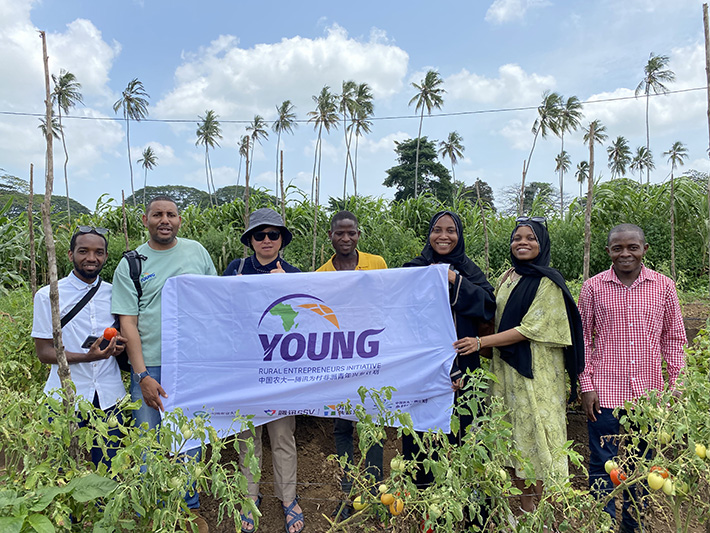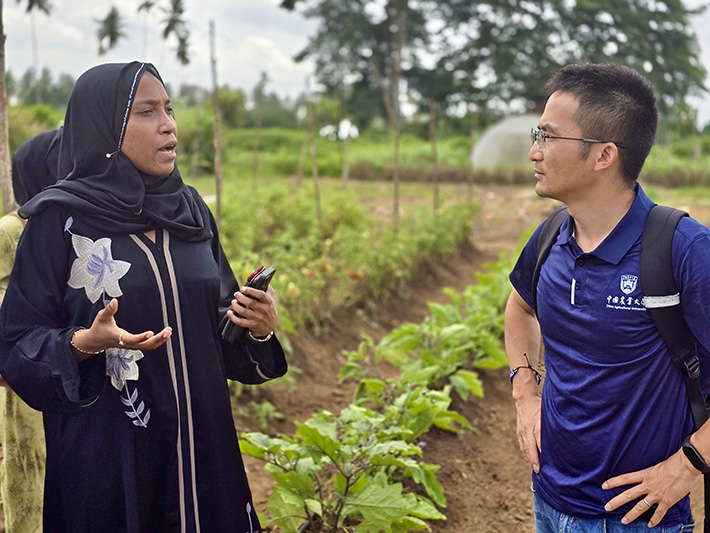|
||||||||||
| Home Top News Economy/Tech Culture/Sports China in Foreign Eyes Green Development Videos Intangible Cultural Heritages |
|
||||||||||
| Home Top News Economy/Tech Culture/Sports China in Foreign Eyes Green Development Videos Intangible Cultural Heritages |
| ChinAfrica |
| Planting Hope in Zanzibar |
| From rice paddies to poultry farms, an ambitious generation of Tanzanian youth is cultivating dreams of agricultural entrepreneurship |
| By LI XIAOYU | VOL. 17 July 2025 ·2025-07-14 |

Jamali Ngwali Makame (right), Abdilahi Khamis Ussi (left), Wahida Athumani Hamadi (third right) and Iknut Said Mussa (second right) pose for a photo with Professor Xu Jin (third left) in Zanzibar, Tanzania, in late January (COURTESY)
A tender breeze sweeps across Zanzibar’s golden paddies at sunrise, carrying with it the calm rhythm of a new day.
Here, Jamali Ngwali Makame surveys his nearly ripe fields, his eyes filled with hope. In his backyard, Abdilahi Khamis Ussi tends to a flock of broiler chickens and sketches plans to expand his poultry enterprise. Elsewhere on the island, Wahida Athumani Hamadi runs her drip-irrigated demonstration farm, coordinating produce orders with hotel clients. In a nearby field, Iknut Said Mussa eagerly awaits her next watermelon harvest. In Bungi-Bikhole, Shaali Makame Chumu cultivates mint, basil, coriander and other high-demand leaf spices with the help of a small team of five employees. But his ambition reaches beyond Zanzibar: to supply both local markets and export organic spices, tapping into the island’s rich agricultural potential. These thriving agricultural ventures share a common root: mentorship from professors at China Agricultural University (CAU).
In July 2024, the CAU-Tencent Africa Young Rural Entrepreneurs Initiative was officially launched in Zanzibar, with support from the island’s Ministry of Trade and Industry, which appointed a full-time coordinator for the project. In November, the five entrepreneurs travelled to China as part of the programme’s inaugural cohort. There, they received training in agricultural branding, digital innovation, rural tourism strategies, and more. Guided by CAU professors, each participant developed a practical business plan adapted to local conditions. In early 2025, Professors Xu Jin and Huang Zhenqian travelled to Zanzibar to offer on-the-ground mentorship, helping the young farmers to bring their ideas to life.
A fragrant dream
Makame’s journey began in a 1-acre (0.405 hectare) rice paddy, where he cultivates SUPA BC, a high-yield aromatic variety. While his crops promise a bountiful harvest, the road to success is not without obstacles. Despite proximity to an irrigation canal constructed by Tanzania’s Ministry of Agriculture, Makame struggles with high usage fees. Purchasing quality seeds like SUPA BC strains his limited budget, and the labour-intensive nature of rice farming further raises operational costs.
Undeterred, Makame has embraced his mentors’ advice. With CAU’s support, he has begun partnering with nearby farmers to share irrigation costs. He is also learning to access agricultural subsidies and cooperative financing. Technical guidance on planting and harvesting techniques is helping him to improve yields while cutting expenses. Makame remains confident: “As long as I keep going, my rice fields will grow, and so will my fragrant rice dream.”
Ussi’s poultry venture began with a few chickens in his uncle’s yard. Today, he runs a 1,000-bird broiler operation in two cycles of 500 birds each, while managing a full-time job at a local spice company. A graduate in agriculture from the State University of Zanzibar, Ussi single-handedly handles feeding, vaccinations, and daily care, starting his day at 5 a.m.
But his ambitions are bigger. He plans to expand to 1,200 birds and install automatic feeding and watering systems. Having previously received training in Israel on black soldier fly (BSF) technology, he is now exploring processing BSFs as chicken feed to lower costs.
During the CAU training, mentor Zhang Yue helped Ussi to analyse cost savings from BSF feed and identify equipment suppliers. “Time management was one of the most valuable skills I learned. It helps me to stay productive, even with limited time,” Ussi said. Zhang also encouraged him to start a cooperative network for sharing resources and marketing. That idea is already part of Ussi’s business plan. “Collaborating with peers is essential for long-term success,” he explained. His goal is to establish a modern, sustainable poultry business delivering quality chicken to Tanzanian markets.
Hamadi is piloting a contract farming model tailored to Zanzibar’s market. Operating two plots, she supplies tomatoes from her larger field to local markets and uses a smaller demonstration plot to showcase high-value produce.
At CAU, she gained hands-on experience in drip irrigation, crop rotation, and quality control. Back home, she tailored those techniques to Zanzibar’s specific challenges: intermittent electricity, intense heat, and limited water. She upgraded her irrigation system, tested succession planting, and introduced biological pest control.
To better link supply with demand, mentor Huang helped Hamadi to develop customer profiles and explore pre-sale contracts. Now, hotels and supermarkets tour her demo plot to select crop varieties for future delivery. Huang also advised her to stagger sowing dates while synchronising harvests for client visits: “Let clients see all of the crops ready during one visit - it speeds up decisions.”
During their January 2025 visit, the mentors helped her to refine strategies for managing irrigation costs, crop selection, and client engagement. Although her enterprise is still at a nascent stage, Hamadi is earning praise from local buyers. “She’s thinking strategically and executing steadily,” Huang told ChinAfrica. “We’ll continue supporting her journey.”

Professor Huang Zhenqian (right) provides on-site guidance to Wahida Athumani Hamadi in Zanzibar, Tanzania, in late January (COURTESY)
Determined to succeed
Previously employed in tourism, Mussa changed her field of operation after training with mentor Zhang Chuanhong. Upon returning from China in late 2024, she planted 1 acre of watermelon. By early 2025, her first harvest was already delivering promising returns. Large melons sell for up to 3,000 Tanzanian shillings ($1.14) each - a solid start.
Still, she faces challenges such as erratic power supply for irrigation, heat stress on crops, and high labour costs. Mussa continues to balance her day job with early morning and evening farm work, cautiously weighing the costs of hiring additional help.
Determined to move forward, she is negotiating supply deals with hotels and wholesalers while using her first season to refine her business model. With ongoing guidance from CAU mentors on market strategy and crop planning, she is steadily expanding her agricultural footprint.
In Zanzibar, China’s experience in rural revitalisation is taking root in fertile new soil. A new generation of African farmers is emerging - one that blends business savvy with technological innovation. And with every seed sown, chicken raised, and melon harvested, they are not just growing food, but shaping a future defined by sustainability, entrepreneurship, and cross-continental cooperation.
|
||||||||||||
| About Us | Contact Us | Advertise with Us | Subscribe |
| Copyright Beijing Review All rights reserved 京ICP备08005356号-5 京公网安备110102005860号 |